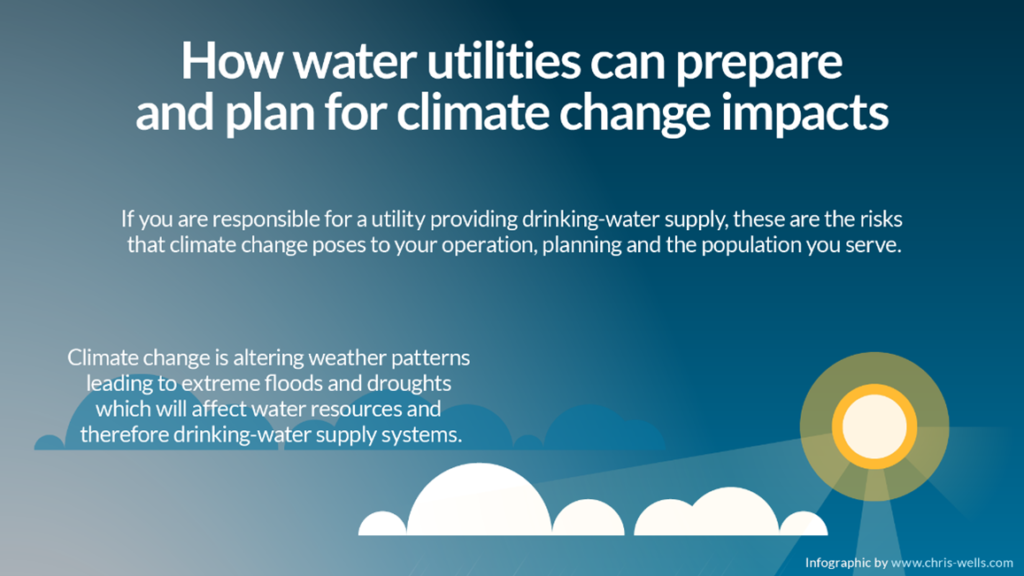Utilities must build resilience to counter climate change
Utilities must build resilience to counter climate change
Climate change is already an established reality in Africa. Prolonged droughts, unprecedented floods, depleted rain forests, and ocean acidification are regional climate phenomena that threaten resources, livelihoods, and human wellbeing. The State of the Climate in Africa 2019 report confirms that these events are having catastrophic impacts on human life and the environment.
Climate impacts on water utilities
Climatic events can only exacerbate the challenges faced by water utilities. Even without climate change, water utilities face operational challenges in the delivery of sustainable services. Some of these include growing urban population, repairing or replacing ageing infrastructure, and increased competition for limited water resources.
Climate Resilient Water Safety Planning
Water utilities must build resilience as an integral part of water management in order to achieve universal access to clean water and sanitation (SDG 6) and confront climate related challenges. Water Safety Plans (WSP) are a globally recognised planning approach. They involve undertaking a proactive and comprehensive risk assessment and risk management process to ensure the safety and security of drinking-water supplies. In the WSP approach, risks are identified, prioritized, and managed before problems occur. This makes them a valuable asset in addressing the impacts of climate change.
IWA, with support from the OPEC Fund for International Development (OFID), worked with African water utilities from 2018 – 2020 on a project to develop and implement climate resilient Water Safety Plans. Utility staff and stakeholders were supported through activities such as WSP training, WSP development and implementation courses, and via several workshops.
Jude Nartey from Ghana Water said: “The information gathered during this project helps me to understand, familiarize myself when analyzing, and assess the presence of natural hazards and their effect on our water treatment plants, based on the vulnerability associated with such phenomena.”
A key tool in the Flood and Drought Portal was the Water Safety Planning application which helps utilities to document their WSP, while also taking into account climate impacts. Incorporating climate impacts is a necessary step as Gane Kane from SEN’EAU remarks: “Taking the issue of climate into account in the framework of the WSP has opened up a large possibility for us to anticipate how climatic events are likely to influence its implementation.”
Selected staff from each country took part in a “Training of Trainers” which enhanced the knowledge, skills, and expertise of participants to become WSP ambassadors.
Manuel Tettey, from Ghana Water, said: “Training received during the project has increased my overall awareness of the need to consider climate related issues in our WSP as a utility and it has also affected my understanding on the impact of climate change on the operations of water production systems. I am well placed to better explain the benefits of WSP to other colleagues who did not have the chance to be part of this project”. While Bombiri Isai, from ONEA, added: “As a result of this training, we realized how WSPs are essential to guarantee the quality of the water in a sustainable way, and therefore, the health of consumers. We have strengthened our capacity to put in place a WSP.”
Another lesson learned was the importance of engaging with stakeholders, such as local government, who play a key role in the catchment. For example, Yaw Boateng, from the Water Resources Commission in Ghana, stated: “As an Assistant Basin Officer, the project has changed my understanding of climate resilient WSP and has also improved my relationship with other stakeholders within the catchment.”
Finally, it must be noted that the commitment, involvement, and support of key decision makers are necessary for an effective implementation of WSP. Doing so helps to ensure that materials, people, and logistical resources can be made available when needed – thereby leading to improved outcomes.
For more information visit the project page and the Water Safety Portal.


